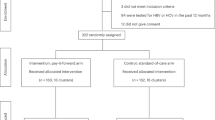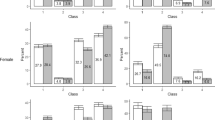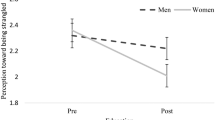Abstract
Secondary distribution of HIV self-testing (HIVST) among individual social networks was an effective approach to expanding HIV testing among men who have sex with men (MSM). However, understanding the factors associated with first-time HIV testing behaviors in the secondary distribution of HIVST programs is limited. Hence, this study aims to identify factors related to first-time testers in the secondary distribution of HIVST. Participants were recruited from five provinces in southern China through Blued, a geo-social gay networking app in China from January 2021 to December 2021. Eligible consented participants (referred to as “seeds”) finished a baseline survey and then applied for up to five HIVST kits. They were encouraged to distribute HIVST kits to other MSM (referred to as “alters”) and alters were encouraged to scan a QR code to return their photographed testing results. All alters were invited to finish an online survey. In total, 229 seeds reached 292 alters, among whom 126 (43.2%) were first-time testers whereas 166 (56.8%) were non-first-time testers. Importantly, our results demonstrated that the first-time HIV testers were more likely to self-report as heterosexual (aOR = 4.88, 95% CI 1.01–23.61), disclose sexual orientation and/or SSB (aOR = 1.73, 95% CI 1.01–2.96), and receive HIVST knowledge from the seeds (aOR = 3.25, 95% CI 1.02–10.34). However, those who had sex with male partners in the last three months were less likely to be first-time testers (aOR = 0.43, 95% CI 0.23–0.82). Practical implications and limitations were also discussed to improve future HIV prevention programs.
Similar content being viewed by others
References
Tang W, Wu D. Opportunities and challenges for HIV self-testing in China. Lancet HIV. 2018;5:e611–2. https://doi.org/10.1016/S2352-3018(18)30244-3.
He N. Research Progress in the epidemiology of HIV/AIDS in China. China CDC Wkly. 2021;3:1022–30.
McGuire M, de Waal A, Karellis A, Janssen R, Engel N, Sampath R, et al. HIV self-testing with digital supports as the new paradigm: a systematic review of global evidence (2010–2021). EClinicalMedicine. 2021;39:101059. https://doi.org/10.1016/j.eclinm.2021.101059.
Bai X, Xu J, Yang J, Yang B, Yu M, Gao Y et al. HIV prevalence and high-risk sexual behaviours among MSM repeat and first-time testers in China: implications for HIV prevention. J Int AIDS Soc. 2014;17.
WHO. HIV Testing Services - WHO Recommends HIV Self-Testing. Policy Br. 2016;0:1–2. www.who.int/hiv.
Lyu H, Feng Y, Zhou Y, Guo Z, Wang Y, Cui M, et al. Factors Associated with First-Time HIV Testing among MSM via secondary distribution of HIV Self-test kits in Zhuhai, China. AIDS Behav. 2022. https://doi.org/10.1007/s10461-022-03927-8.
UNADIS, AIDSinfo. 2022. https://aidsinfo.unaids.org/.
Wu D, Tang W, Lu H, Zhang TP, Cao B, Ong JJ et al. Leading by example:web-based sexual health influencers among men who have sex with men have higher HIV and syphilis testing rates in China. J Med Internet Res. 2019;21.
Cambiano V, Johnson CC, Hatzold K, Terris-Prestholt F, Maheswaran H, Thirumurthy H, et al. The impact and cost-effectiveness of community-based HIV self-testing in sub-saharan Africa: a health economic and modelling analysis. J Int AIDS Soc. 2019;22:82–93.
Zhang C, Li X, Brecht ML, Koniak-Griffin D. Can self-testing increase HIV testing among men who have sex with men: a systematic review and meta-analysis. PLoS ONE. 2017;12:1–19.
Jiang H, Xie Y, Xiong Y, Zhou Y, Lin K, Yan Y, et al. HIV self-testing partially filled the HIV testing gap among men who have sex with men in China during the COVID-19 pandemic: results from an online survey. J Int AIDS Soc. 2021;24:1–6.
Lu Y, Ni Y, Wang Q, Jing F, Zhou Y, He X, et al. Effectiveness of sexual health influencers identified by an ensemble machine learning model in promoting secondary distribution of HIV self-testing among men who have sex with men in China: study protocol for a quasi-experimental trial. BMC Public Health. 2021;21:1–9.
Yang N, Wu D, Zhou Y, Huang S, He X, Tucker J, et al. Sexual health influencer distribution of HIV/Syphilis self-tests among men who have sex with men in China: secondary analysis to inform community-based interventions. J Med Internet Res. 2021;23:1–10.
Kumar N, Forastiere L, Janmohamed K, Yang F, Zhang T, Sha Y, et al. Improving HIV Self-Testing Social Network interventions: the role of sexual Behavior Disclosure among Chinese men who have sex with men. AIDS Behav. 2021;25:1984–92. https://doi.org/10.1007/s10461-020-03128-1.
Bjørnshagen V, Moseng BU, Ugreninov E. Who do you Reach? A Norwegian Pilot Project on HIV Self-Testing that targeted men who have sex with men. AIDS Behav. 2020;24:568–79. https://doi.org/10.1007/s10461-019-02484-x.
De Anda S, Njoroge A, Njuguna I, Dunbar MD, Abuna F, Macharia P, et al. Predictors of first-time and repeat HIV Testing among HIV-Positive individuals in Kenya. J Acquir Immune Defic Syndr. 2020;85:399–407.
Holden J, Goheen J, Jett-Goheen M, Barnes M, Hsieh YH, Gaydos CA. An evaluation of the SD bioline HIV/syphilis duo test. Int J STD AIDS. 2018;29:57–62.
Wu D, Zhou Y, Yang N, Huang S, He X, Tucker J et al. Social media-based secondary distribution of Hiv/Syphilis self-testing among Chinese men who have sex with men. Lancet. 2020.
Zhao P, Zhou Y, Ni Y, Lu Y, Huang S, Yang J, et al. Testing together behaviors in secondary distribution of HIV/Syphilis Self-Testing Program among men who have sex with men in China. AIDS Behav. 2022. https://doi.org/10.1007/s10461-022-03879-z.
Sibanda EL, McCoy SI. Secondary distribution of HIV self-tests improves coverage. Lancet HIV. 2020;7:e732–3. https://doi.org/10.1016/S2352-3018(20)30237-X.
Rodger AJ, McCabe L, Phillips AN, Lampe FC, Burns F, Ward D, et al. Free HIV self-test for identification and linkage to care of previously undetected HIV infection in men who have sex with men in England and Wales (SELPHI): an open-label, internet-based, randomised controlled trial. Lancet HIV. 2022;9:e838–47. https://doi.org/10.1016/S2352-3018(22)00266-1.
Lau JTF, Wang M, Wong HN, Tsui HY, Jia M, Cheng F, et al. Prevalence of bisexual behaviors among men who have sex with men (MSM) in China and associations between condom use in MSM and heterosexual behaviors. Sex Transm Dis. 2008;35:406–13.
Choi KH, Steward WT, Miège P, Hudes E, Gregorich SE, Sexual Stigma. Coping styles, and psychological distress: a longitudinal study of men who have sex with men in Beijing, China. Arch Sex Behav. 2016;45:1483–91.
Pando MA, Dolezal C, Marone RO, Barreda V, Carballo-Diéguez A, Avila MM, et al. High acceptability of rapid HIV self-testing among a diverse sample of MSM from Buenos Aires, Argentina. PLoS ONE. 2017;12:1–12.
Wei C, Yan H, Yang C, Raymond HF, Li J, Yang H, et al. Accessing HIV testing and treatment among men who have sex with men in China: a qualitative study. AIDS Care - Psychol Socio-Medical Asp AIDS/HIV. 2014;26:372–8.
Adeagbo OA, Seeley J, Gumede D, Xulu S, Dlamini N, Luthuli M, et al. Process evaluation of peer-to-peer delivery of HIV self-testing and sexual health information to support HIV prevention among youth in rural KwaZulu-Natal, South Africa: qualitative analysis. BMJ Open. 2022;12:1–9.
Reblin M, Uchino BN. Social and emotional support and its implication for health. Curr Opin Psychiatry. 2008;21:201–5.
Chen WT, Han M. Knowledge, attitudes, perceived vulnerability of Chinese nurses and their preferences for caring for HIV-positive individuals: a cross-sectional survey. J Clin Nurs. 2010;19:3227–34. https://doi.org/10.1111/j.1365-2702.2010.03373.x.
Acknowledgements
We thank all the participants who participated in this study.
Funding
https://doi.org/10.13039/501100012165 Key Technologies Research and Development Program 2022YFC2304900-4 to WT Dr. Weiming Tang Ph.D. 0000-0002-9026-707X https://doi.org/10.13039/100000060 National Institute of Allergy and Infectious Diseases R01AI158826 Dr Joseph D. Tucker.
Author information
Authors and Affiliations
Contributions
All authors contributed to the study conception and design. Material preparation and data collection were performed by Yi Zhou, Weiming Tang, Yuxin Ni, Ying Lu and Xi He. Dongya Wang analyzed the data and drafted the manuscript. Weiming Tang made revisions. Yi Zhou, Weiming Tang, Dan Wu, Joseph D. Tucker, Jason Ong, Hang Lyu, Yuxin Ni, Ying Lu, Xi He and Shanzi Huang provided feedback on the draft and revision. All authors equally contributed to this response. All authors read and approved the final version.
Corresponding author
Ethics declarations
Ethical Approval
The Ethics Committee of Zhuhai CDC approved this study. It was approved by Dermatology Hospital of Southern Medical University IRB (#2019020[R3]). Informed consent was collected from each participant online.
Conflict of interest
All authors have declared no conflicts of interest.
Additional information
Publisher’s Note
Springer Nature remains neutral with regard to jurisdictional claims in published maps and institutional affiliations.
Electronic Supplementary Material
Below is the link to the electronic supplementary material.
Rights and permissions
Springer Nature or its licensor (e.g. a society or other partner) holds exclusive rights to this article under a publishing agreement with the author(s) or other rightsholder(s); author self-archiving of the accepted manuscript version of this article is solely governed by the terms of such publishing agreement and applicable law.
About this article
Cite this article
Wang, D., Zhou, Y., Wu, D. et al. Factors Associated with the First-time HIV Testing Among Chinese men who have sex with men Who Received HIV Self-tests from Partners or Friends. AIDS Behav 28, 705–712 (2024). https://doi.org/10.1007/s10461-023-04259-x
Accepted:
Published:
Issue Date:
DOI: https://doi.org/10.1007/s10461-023-04259-x




